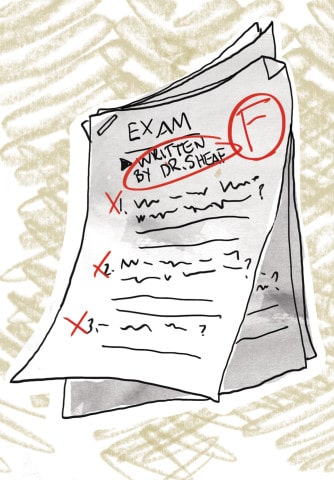MONICA GORDON
 It’s in the university’s best interest to ensure that students are given competent instructors. We need to guarantee professors can properly teach to make sure that students have the best learning opportunity possible.
It’s in the university’s best interest to ensure that students are given competent instructors. We need to guarantee professors can properly teach to make sure that students have the best learning opportunity possible.
We’ve all had that one prof — the one that’s friendly and seems intelligent enough, but can’t teach to save their life. They stare at their notes, they mumble and class is merely a public reading of the assigned textbook.
While not all professors are like this, such an experience is far too common. If students are expected to simply accept constantly increasing tuition rates, we should — at the very least — be entitled to a professor who is capable of properly teaching a class.
While ineffective professors are certainly frustrating, it isn’t surprising that they’re easy to find. Historically, the biggest priority of any modern university has been research and a professor’s value has been in what new research they generate, not their capabilities as an instructor. An inability to teach could be ignored if the individual’s research could improve the university’s reputation. While you can still see the remains of this mentality today, it’s time for a change.
Helping professors become better educators wouldn’t be complicated. By virtue of being a place of learning, the university has the means to teach professors how to be better instructors. Mandatory teaching classes would be a great place to start. When a professor is hired, it should be a requirement for them to enroll in such a class to make sure their skills as lecturers and instructors are up to par.
To make sure old professors are keeping in practice, a potential policy could be that they retake these classes every few years or so to ensure they aren’t developing bad habits or forgetting good ones.
These ideas are mostly directed towards professors who are willing to improve and help students learn. For those who regularly get poor teaching reviews from students, teaching classes should be compulsory until those reviews improve. Holding professors accountable for a lackluster performance would be a great way for the University of Saskatchewan to show commitment to its students.
These sort of policies would greatly benefit both the students and the university. The perks for students are obvious. We will have paid thousands of dollars at the end of our degrees. Students want to get as much out of their time here as possible. Professors who are poor educators directly inhibit the ability to do just that.
Turning professors into quality educators is also in the university’s interests. If students have professors that help them get a better understanding of the subject material, this could translate into higher grades across campus. More students could go on to become distinguished alumni and the prestige that students acquire in their individual careers could easily be reflected back onto the university. Higher grades and accomplished graduates could do as much for the university’s reputation ground-breaking research does.
None of this is to say that the university hasn’t made any effort to help professors. The U of S has the Gwenna Moss Centre for Teaching Effectiveness which offers classes and other tools to aid professors in improving their teaching skills.
While these are steps in the right direction, it’s just not enough. Despite the Gwenna Moss Centre having classes and resources, it’s completely optional for professors to use them. Although some departments are beginning to focus on a professor’s teaching capability, it would be better if the university had an across-the-board policy so that professor quality didn’t vary as much.
It is understandable that some professors aren’t the best teachers. It’s completely possible to be an expert in your field but not be able to effectively teach people about it. However, when this impedes student success, it becomes a problem. Many students are willing to try their hardest to do well. The university should make sure professors are doing their best too.
—
Graphic: Stephanie Mah/Graphics Editor